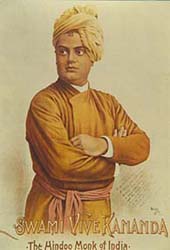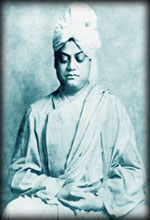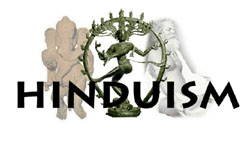Mystical Prose of Swami Vivekananda
 “Vivekananda taught awakened India to come out of the slough
“Vivekananda taught awakened India to come out of the slough
of Despondence and face the world with a new self-confidence
and almost a mission to global humanity.”
K.R.S. Iyengar, Indian Writing in English
(Sterling, 1985)
Vivekananda’s various ser mons and lectures made re nascent Hinduism a force to reckon with. By his deliverance of the lectures, he propagated the thesis that Hinduism has the sap of hoary tradition, and it is also receiving new warmth in the sunshine of modern life.
Next, Vivekananda has emphasized the essential religiosity in the Hindu nature. He saw the religion as the chief creative influence and the distinguishing mark of Indian civilization and culture. He has pointed out in this connection:
To the other nations of the world, religion is one among the many occupations of life. There is politics, there are enjoyments of social life, there is all that wealth can buy or power can bring, there is all that senses can enjoy, and among all these enjoyments of life, there is a bit of religion. But, here in India, religion is the one and the only occupation of life.
Thus, Vivekananda believes that the genius of India is essentially religious and that the character of the civilization, the psychology of the people and the nature of the society have all been shaped by this fact. He wonderfully presents the greatness of Indian religions in the following words:
Is it not curious that whilst under the terrific onset of modern scientific research all old forts of western dogmatic religion are crumbling into dust…. whilst western theology is at its wits end to accommodate itself to the ever rising tide of aggressive modern thought, the religions, which have drunk the water of life at the fountain of light, the Vedas – Hinduism and Buddhism – alone are reviving.
Indeed the part and parcel of Vivekananda’s message is that an Indian drinks religiously, walks religiously, marries religiously and sleeps religiously. However, due to the presence of this sense of spiritual superiority, William Walsh has severely condemned Vivekananda in the following manner:
There is Vivekananda’s profound belief that this Indian spirituality is to be contrasted with western materialism, out of which came his lively concern with India’s spiritual mission to the west.
What Walsh means is that Vivekananda believed that true spirituality has never appeared anywhere in the world, but on the sacred soil of India. And this false sense of religious and spiritual superiority forced Vivekananda to preach of the splendid spiritual growth of India to the west. The assurance of spiritual superiority and the attendant missionary impulse existed in all the influential thinkers of that time and Vivekananda was no exception. Infact, Walsh thinks that Vivekananda too is infected by the certainty that Indian civilization is animated by a spirituality far superior to the materialistic European civilization. To give force to his argument, Walsh Quotes Ursula King. According to Ursula King,
There evolved the notion of the greatness of Indian spirituality in contrast to the shortcomings of Western materialism, consequent upon this emerged the belief in India’s spiritual mission to the west.
Ursula King has further suggested that a contrast with the west had to be sought in order to compensate for both Western political and economic dominance and to fight western contempt for India’s material retardation. In this situation, “to affirm, vindicate and glorify the superiority of Indian spirituality was the Hindu reformers’ and Porto nationalists’ particular way of opposing the West’s own technological superiority” and “spiritual triumph was set over material dominance and spirituality could conquer even more than materialism had done.”
– Ursula King, Social Action
Here, it can be said that the views of William Walsh and Ursula King are highly prejudiced, misleading and biased. The fact is that in place of having this certainty about the belief of spiritual superiority of Indian culture, he admired and appreciated every culture of the universe. Even though he talked of ancient Indian superiority, he did not completely ignore the West. He recognized great virtues in the West – energy, initiative and courage – which he found lacking among Indians. Thus, it is apparent that his sermons were not written in a spirit of negative criticism. He was working for an exchange of values. He recognized certain virtues in Westerners, which he found wanting in the Indians. He wanted to exchange these values for the spiritual growth of mankind. It is due to this exchange of values that he under the influence of western skeptics became agnostic. Indeed, Vivekananda’s temperamental doubt is one of his most inspiring qualities. To be very honest, he doubted too much and too long. But, here it can be added that Vivekananda’s faith was no facile thing. Infact, for Vivekananda to believe meant absolute dedication to the object of his belief. Due to this synthesis of eastern faith and western skepticism, Christopher Isherwood has eloquently praised Vivekananda thus: “He doubted greatly because he was capable of believing greatly.”
On the basis of the above mentioned facts, it can be said that Vivekananda was not a narrow-minded believer in the false assurance of spiritual superiority of the East in comparison to the West as William Walsh has suggested. The sense of spiritual superiority and the attendant missionary impulse to preach the westerners about religion and spirituality are nowhere present in Vivekananda. Therefore, it can be asserted that Walsh’s indictment of Vivekananda’s prose is highly misleading. Infact, he has emphasized the universality of all the religions. He presented the spiritual philosophy behind Hinduism and Buddhism in such a way that he seemed to hint at the cardinal truth behind all religions. Christopher Isherwood aptly comments in this connection: “He stood for something larger than any sect, the ancient Indian doctrine of the universality of the Truth.”
Further, misled by this biased view about Vivekananda’s writings, William Walsh thinks that “there is a broad distinction to be made between the works of Vivekananda composed as commentaries on the sacred texts and closed accounts of the spiritual life and his other works meant for persuasion and propaganda often for foreign audiences”. The first category had an immediacy, spontaneity, simplicity and a relaxed buoyant tone. It shows an exceptionally gifted mind grappling with real questions fo life, destiny and conduct. The other category, in Walsh’s opinion, the writings and sermons of a missionary kind, like the address to the Parliament of Religions at Chicago in 1893, seem in contrast sentimental and histrionic and one has the impression of a series of rather feverish encyclicals delivered with pomp and ceremony. To prove his point of view, Walsh gives an illustration, written for the Hindus in Madras in 1894, as a reply to their address of welcome and congratulation to Vivekananda on his success in United States. According to Walsh, this piece of prose work displays the less attractive qualities, which the missionary role was apt to provoke:
Shall India die? Then from the world all spirituality will be extinct; all moral perfection will be extinct, all ideality will be extinct; and in its place will reign the duality of lust and luxury as the male and female deities, with money as its priest; fraud, force and competition its ceremonies and the human soul its sacrifice…
Here, it is pertinent to say that Walsh’s this division of Vivekananda’s work is entirely false. First of all, it is wrong to assume that any of Vivekananda’s work is of propagandist type. And by this division to call his sermons for the westerners and specially his address at the Parliament of Religions – histrionic, sentimental and propagandist – is completely wrong. Walsh believes that this type of Vivekananda’s writings display the less attractive qualities of his work, which is not correct. The fact is that all the works of Vivekananda, including the sermons to the Europeans are animated by an immediacy, spontaneity and a relaxed buoyant tone. And in this spontaneous and relaxed buoyant, he has described the basic tenets to lead a religious life.
Infact, he was above all a religious writer of outstanding merit. He is not “flamboyant” as Walsh has suggested, but is invariably sincere. At his best, he has the intuitiveness, the intensity, depth, sharpness and the bare immediacy of a true mystic. For instance, in his writings on Buddha, he has exhibited not only judgment and appreciation of a true mystic but that marvelous open-minded characteristic so powerfully called Indian. For example, mark the following example:
The life of Buddha shows that even a man who does not believe in God, has no metaphysics, belongs to no sect, does not go to any Church or temple and is a confessed materialist, even he can attain to the highest… Perfection does not come from belief and faith. Perfection comes through the disinterested performance of action.
 We may also look at the following words of Vivekananda:
We may also look at the following words of Vivekananda:
When we know that we are the Self, then – we are free. The Self can never change. It cannot be acted on by a cause, because it is itself the cause. It is self-caused. If we can find in ourselves something that is not acted on by any cause, then we have known the self.
By the perusal of the above statements, it can be said that this wandering monk has dealt in detail with that super conscious experience, which the Hindus call Samadhi. In Vivekananda’s opinion, in Samadhi, personal identity vanishes and the real self is known.
Some critics think that Vivekananda’s love for religious spiritualism makes him somewhat orthodox. William Walsh again comments in this regard : “Vivekananda stood for what was ancient and orthodox. This made his stand on, for example, women’s right – and particularly the position of the widows – seem at least to the foreigner to be enigmatic or even hedging and certainly less robustly liberal than Ram Mohan Roy’s.”
However, Walsh’s view is incorrect. The truth lies in the fact that he was one of the most liberal men of modern India as his spiritualism is marked by his intense humanism. His religion was for the man. He believed that religion was of no avail if it “can not wipe out widow’s tears or bring a piece of bread to the orphan’s mouth.” Infact, inspired by his liberal socialistic humanism, he confessed that “religion is not for empty bellies.” He also uttered, “If you want to find God, serve man.”
Thus, it is clear that in his approach to social problems like widow marriage, caste system and poverty etc., he was not orthodox, but highly liberal. Nehru has aptly commented in this connection, “Rooted in the past of India’s heritage, Vivekananda was yet modern in his approach to life’s problems and a kind of bridge between the past of India and her present.”
On account of this liberal socialistic outlook, unlike the general sum of ecstatics, Vivekananda saw that to realize the ultimate truth, one should help in allaying poverty. Inspired by his liberal socialism, he artistically presents the lot of the poor in these words:
These common people have suffered oppression for thousand of years, and suffered it without murmur.
Next, his non-conservative socialist point view is visible in these lines too, where he indicts the upper privileged classes for their indifference to the plight of the poor and the downtrodden:
You, the upper classes of India! Do you think that you are alive? You are but mummies ten thousand years old! … You are the real walking corpses.
Thus, it is obvious that William Walsh’s indictment is based on prejudices, as Vivekananda is not orthodox, but highly liberal, as is apparent from the synthesis of his intense social concern with his spirituality. Due to this synthesis of these two elements in his personality and sermons, “eyewitnesses were inspired by the majesty of his presence”. (Christopher Isherwood)
However, despite the favorable views of Isherwood and various other thinkers about Vivekananda, K.R.S. Iyengar thinks that his intense concern for high and excellent thought has marred his artistic talents as a prose writer. Iyengar writes:
The many volumes of his English prose constitute part of India’s cultural history, but he should be counted more among our prophets and builders than among the masters of prose.
Iyengar’s assumption is based on the fact that Vivekananda spoke and wrote so often and with such intensity of feeling that he could hardly find the time or be in the mood to pause or refine his sentences. The view of Iyengar is partly true. The other side of the coin is that his prose language shows the native energy of his mind. Besides, he was capable of using highly artistic language, as is evident from this reference:
The human mind is like that monkey, incessantly active by its own nature; then it becomes drunk with the wine of desire, thus increasing its turbulence. After desire takes the possession comes the sting of the scorpion of jealousy at the success of others, and last of all the demon of pride enters the mind, making it think itself all important. How hard to control such a mind!
Next, to communicate his ideas, he used a simple, transparent and energetic style, which eschewed all oratorical flourishes and communicated with the directness of an arrow hitting its mark. In fact, he wrote with disciplined simplicity. For instance, we may mark the following expression:
The three essentials of Hinduism are belief in God, in the Vedas as revelation, in the doctrine of Karma and transmigration.
 If one studies the Vedas between the lines, one sees a religion of harmony.
If one studies the Vedas between the lines, one sees a religion of harmony.
One point of difference between Hinduism and other religions is that in Hinduism we pass from truth to truth – from a lower truth to a higher truth – and never from error to truth.
The Vedas should be studied through the eye – glass of evolution. They contain the whole history of the progress of religious consciousness, until religion has reached perfection in unity.
Thus, Viveka-nanda’s prose style is lucid, clear, simple and transparent; and we can forcefully argue that Vivekananda had high artistic merits and Iyengar’s indictment that he “should not be counted among the masters of our prose” is misleading. The truth lies in the fact that in highly simple language, he has described his religious philosophy.
Next, he always related experiences in a humorous vein and he was never at a loss for a repartee. Isherwood narrates that when Vivekananda was in poor health, a correspondent asked him, “Are you never serious, Swamiji?” Swamiji replied with a sense of humor, “Oh, yes when I have belly ache”.
Thus, it is obvious that he narrated the story of India’s spiritual growth in humorous and artistic way. That is why, “everyone was impressed by the extraordinary deep bell-like beauty of his voice and certain of its vibrations caused a mysterious psychic excitement among his hearers”.
– Christopher Isherwood
Valentile Chirol too praises him in these words, “Vivekananda was the first Hindu whose personality won recognition abroad for India’s ancient civilization…” As he awakened the despondent and sloth-loving Indians by his religious thoughts, Nehru has praised him thus: “He came as a tonic to the depressed and demoralized Hindu mind and gave it self-reliance and some roots in the past.”






























